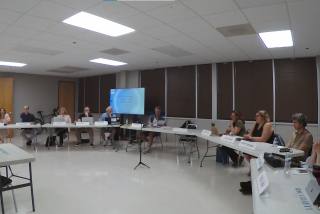Gay Church Fails in Bid to Join National Council
- Share via
CLEVELAND — A Los Angeles-based church composed mostly of gays and lesbians has failed once again in a bid to establish formal ties to the National Council of Churches, but not without raising an angry and loud voice of protest at a meeting of the council’s top policy-making body.
After the council’s General Board voted 90 to 81 Thursday not to act on an application from the 30,000-member Metropolitan Community Churches, angry gays and lesbians took over the microphones and accused the council of trying to maintain its unity at the expense of homosexual church members.
“It’s easier to get into heaven than into the NCC,” declared the first speaker at the microphone, the Rev. Nancy Wilson, ecumenical officer of the denomination.
In 1983, the council indefinitely tabled the church’s application for full membership and then embarked on a series of meetings with leaders of the church. This year, leaders of the church decided to back off on full membership and filed an application for “observer” status, saying the “homophobia” of other churches made full membership an unlikely possibility.
Threats of a pullout by Orthodox churches were largely responsible for the 1983 decision to table the Metropolitan Community Church application. Martin Bailey, top communications official for the council, said Orthodox representatives were at the center of the opposition Thursday, joined by significant numbers of Korean Presbyterians and African-Americans.
After the meeting, Wilson rejected the board’s recommendation that talks continue between the National Council and Metropolitan Community Churches, saying there would be no point to such talks after the church had been so severely rebuffed.
The decision was “one of the most painful decisions” in the 42-year history of the council, an official council summary of the meeting said.
According to Bailey, an unofficial poll of leaders from the council’s 32-member denominations indicated that as many as 12 churches might leave the council if the Metropolitan Community Churches were granted observer status.
Observer status would entitle the church to attend meetings, to speak when invited by the chair, and to participate on committees. Current observers to the council include the Unitarian Universalist Assn. and groups representing Muslims and Jews.
More to Read
Sign up for Essential California
The most important California stories and recommendations in your inbox every morning.
You may occasionally receive promotional content from the Los Angeles Times.













